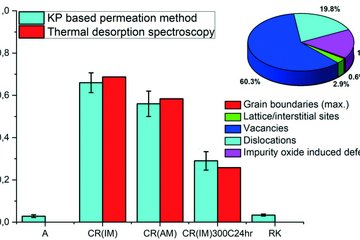All genres
921.
Talk
Quasiparticle band offsets at heterojunctions from GW superlattice calculations. DPG Frühjahrstagung 2011, Dresden, Germany (2011)
922.
Talk
Ab initio prediction of thermodynamic data for selected phases of the Al–Mg–Si–Cu system. DPG conference, Dresden, Germany (2011)
923.
Talk
Finite temperature magnetism combining first-principles and spin Quantum Monte Carlo. DPG Frühjahrstagung, 2011, Dresden, Germany (2011)
924.
Talk
Superabundant vacancies in fcc metals: A combination of ab-initio, thermodynamic and kinetics approaches. DPG 2011 Meeting, Dresden, Germany (2011)
925.
Talk
EPR parameters of the dangling bond defect in crystalline and amorphous silion: A DFT-study. DPG spring meeting 2011, Dresden, Germany (2011)
926.
Talk
Hydrogen adsorption on polar ZnO(0001)–Zn - Extending equilibrium surface phase diagrams to kinetically stabilised structures. DPG Frühjahrstagung 2011, Dresden, Germany (2011)
927.
Talk
Effect of H on homogeneous dislocation nucleation: Consequences for hydrogen embrittlement. DPG Frühjahrstagung der Sektion Kondensierte Materie (SKM), Dresden, Germany (2011)
928.
Talk
First principles study of elastic properties of eutectic Ti-Fe alloys up to their mechanical stability limits. DPG Spring Meeting 2011, Dresden, Germany (2011)
929.
Talk
Enhancing mechanical properties of calcite by Mg substitutions - An ab initio study. American Physical Society - March Meeting, Dallas, TX, USA (2011)
930.
Talk
Mechanical Design Principles of Crustacean Cuticle evaluated experimentally and by Ab initio-based Multiscale Simulations. Institute Colloquium, Institut de Mécanique des Fluides et des Solides, CNRS, Strasbourg, France (2011)
931.
Talk
First principles concepts to calculate thermodynamic properties of magnetic materials. ICAMS Advanced Discussions, Bochum, Germany (2011)
932.
Talk
Materials design based on ab initio thermodynamics: Development of accurate and efficient multiscale strategies. DPG-Tagung, Dresden, Germany (2011)
933.
Talk
Chemical Trends for Phase Transitions in Magnetic Shape Memory Alloys Derived from First Principles. TMS2011, San Diego, CA, USA (2011)
934.
Talk
Ab Initio Determination of Point Defect Kinetics in Fe-Based Alloys. TMS 2011 Meeting, San Diego, CA, USA (2011)
935.
Talk
Strain-Induced Metal-Hydrogen Interactions across the First Transition Series – An Ab Initio Study of Hydrogen Embrittlement. TMS 2011 Meeting, San Diego, CA, USA (2011)
936.
Talk
First results of modeling and literature overview. HYDRAMICROS Workshop, Linz, Austria (2011)
937.
Talk
Ab initio based modeling of metallic alloys: From a predictive thermodynamic description to tailored mechanical properties. Colloquium at University of California-Santa Barbara, Santa Barbara, CA, USA (2011)
938.
Talk
Grain Boundary Kinetics in Molecular Dynamics: The Effect of the Driving Force on Mobility and Migration Mechanisms. TMS 2011, San Diego, CA, USA (2011)
939.
Talk
Combining ab initio calculations and high-resolution experiments to understand advanced Mg alloys. German-Korean workshop on the “Production and industrial applications of semi-finished Mg products”, Irsee, Germany (2011)
940.
Talk
On the accuracy of ion hydration energies - An ab initio study. 1st Austrian-German workshop on Computational Materials Design, Kramsach, Austria (2011)











